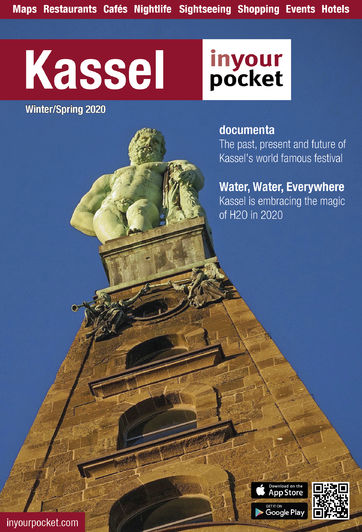Statistics
Population of Germany (2024): 83,875,684Kassel: 207,881 (2024)
Longest river in Germany: Rhine, 1,319km
River through Kassel: Fulda, 220,4 km
Highest point of Germany: Zugspitze, 2,962m
Highest point in Kassel: Hercules monument in the Wilhelmshöhe park, 515m
Lowest point in Kassel: Fulda river at Niederzwehren, 170m
Kassel's territory: 107 square kilometres
Green Kassel: 75% of the city territory is parks and greenery
Tourism in Kassel: 1,016,000 hotel nights, 562,000 hotel guests in 2019
Climate and weather
Kassel enjoys a continental climate, with average temperatures between 12 and 22°C in summer and -2 to 2°C in winter. Rainfall is quite constant at about 5-8cm per month, so don't forget that umbrella.Crime & Safety
Kassel is a calm and safe city. Instances of petty crimes are low, though you should still always keep an eye on your valuables and never leave bags, wallets and mobile phones unattended. Just like anywhere else, be careful when walking in unlit streets late at night.
Disabled travellers
Kassel is increasingly geared towards disabled visitors, though many restaurants and bars are still difficult to access. The tram system is increasingly friendly with low thresholds. When confused, ask a young mother with a pram for tips.Drinks & Alcohol
Germans like their beer, drinking about 107 litres per capita per year (down from 136 litres 20 years ago). The Martini Brauerei has been brewing good beer in Kassel since 1859, and its Martini and Kasseler beers can be sampled in bars across town. Cocktails and long drinks of varying quality and price are available in a multitude of places. Non-alcoholic drinks often sipped in Germany include Apfelschorle, a refreshing mix of apple juice and sparkling water, and Spezi, cola mixed with orange soda.Electricity
Electrical current in Germany is 220v AC, 50 Hz via standard European round, two-pin sockets. Converters can be bought at the airport and large electronics shops, and many hotels will have them at the front desk too.Emergency numbers
Emergencies, ambulance, fire, police: tel. 112Emergency doctor service: tel. +49 561 192 92
Non-urgent police matters: tel. +49 561 91 00
Exchange rate
The exchange rate is: EUR €1 = GBP £0,83 = USD $1,09= CAD $1,46 = AUD $1,62 = JPY 156 = CNY 7,66 = RUB 98,8 (per 1 October 2024)Money
Germany uses the euro (€). Banknotes come in denominations of €5, €10, €20, €50, €100, €200 and €500. Coins, whose design depends on in which country they were minted, come in denominations of 1, 2, 5, 10, 20 and 50 cents and €1 and €2. Credit and debit card payment is possible in a wide range of shops, restaurants and nightlife venues, but it's not as common as abroad so always have some cash on you just in case. ATMs can be found everywhere; the few that charge for transactions clearly indicate the fee during the process.Public holidays in Hesse, 2017
1 January New Year
14 April Good Friday
17 April Easter Monday
1 May Labour Day
25 May Ascension
5 June Pentecost
15 June Corpus Christi
3 October Unification Day
31 October Reformation Day
25-26 December Christmas
Visas and entry formalities
EU citizens can stay in Germany as long as they like, though registration at a Bürgeramt office is officially required for stays more than a few months. Citizens of Australia, Canada, Hong Kong, Japan, Malaysia, New Zealand, Mexico USA and a few others can enter Germany without a visa for a maximum of 90 days in any six month period. All other nationals need to apply for a German visa in advance. Note that there's no passport control between Germany and the other 14 European 'Schengen' countries, and visas to any of these are valid for travel in Germany too. All visitors need a passport that is valid for at least fourth months from the date of arrival; EU citizens can enter with a valid EU identity card too. Check the MFA website for the latest immigration details: www.auswaertiges-amt.de.





Comments